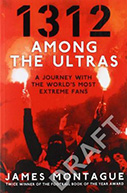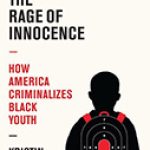1312: Among the Ultras – A Journey with the World’s Most Extreme Fans

Author: James Montague
Publisher: Penguin Random House UK, 2021. 416 pages.
Reviewer: Declan Hill ǀ March 2022
It was one of the biggest events in international sport, and it turned into a mass murder. On June 14, 1985, the European Champions Cup Final was played between two of the most successful clubs in the world: England’s Liverpool and Italy’s Juventus. It was a huge game – a combination of the financial might of the Super Bowl meets the international flavour of the United Nations. The match was televised to hundreds-of-millions of people. The audience thought that they were going to watch a soccer game; what they saw was slaughter.
Liverpool soccer fans rampaged through the Belgian stadium. They cornered thousands of Italians against a cement wall that then collapsed under the pressure. They followed this up by throwing pavement piles at the retreating fans. In all, 39 people were killed and over 600 were injured.
In the aftermath, both Belgian government inquiries and British criminal investigations established that the English fans were solely to blame for the massacre.
**
Latin used to be the common language of intellectuals. If a Spanish medieval courtier spoke to an Irish ambassador, they used Latin. After the 1600s, it was replaced by French. With the rise of the American dollar, English became the international language of business.
James Montague makes a good case that, now, the language of soccer [1] would be a good rival. If a person wants to truly understand the culture of many countries, they need to speak soccer. Understand the sport and you understand much about the sometimes secret or unknown underpinnings of a country.
In Iraq, there are few better symbolic examples of the disastrous American intervention, and the sheer ignorance that accompanied it, then the night that U.S. diplomats cowered in their rooms inside Baghdad’s Green Zone. Outside, the air was filled with the sounds of gunshots and the sights of tracer bullets arching through the night sky. The outsiders thought it was a battle between the Marines and some Shiite militia group. The Iraqis were actually celebrating the victory of their national team in an Asian soccer tournament.
In Egypt, conventional wisdom claims that the 2011 democratic movement was catalyzed by American social media. That might be so, but an equally important factor was the need for groups of well-organized, young men who were ready to fight the government forces. On the streets, ’likes’ on Twitter and Facebook are not going to help when hundreds of well-armed policemen are charging. On the other hand, having a large number of soccer hooligans, used to brawling with the cops, is a genuine protection.
It is a lesson that the Egyptian military understood well after they retook power by deposing the elected President Morsi in 2013. A few months later, hundreds of members of the largest football hooligan group who helped the democratic movement were lured into an alleyway in Port Said. They were massacred by government forces. For good measure, the military government then charged the leaders of the hooligans with killing their own people and jailed them. Since then, there has been no repeat of genuine democracy in Egypt.
James Montague’s 1312 provides countless similar examples. He points out that the 2014 ‘Maidan Revolution’ in Ukraine was also significantly propelled by well-organized groups of soccer fans. His chapters on the influence of soccer hooligans on the politics of Serbia and Croatia should be required reading for all diplomats and foreign business people posted there. One example from many– the genocidal Balkan Wars of the 1990s started at a soccer game.
Montagues is an independent reporter whose work has appeared on CNN, Bleacher Report and World Soccer. In this book, he travels across Latin America, Europe and Asia to investigate some of the toughest hooligan groups in the world. He shows impressive courage. He goes to derby matches between soccer clubs (this is not in his book but it is impossible to understand Scotland unless you understand Celtic vs. Rangers) and witnesses the violence that accompanies many of these games. He also meets and interviews the leaders of the ultra groups. Montague is very interested in knowing why they do what they do.
In this work, the author is treading a long-path of research. Academics have been examining soccer hooligans for decades. In the 1970s, Ian Taylor and the Marxist-influenced Oxford School argued that the fans were disaffected working class men who were acting out their lack of economic opportunity in the stadiums. This was a theory that held sway until researchers in the 1980s pointed out the large number of middle-class men who joined hooligan groups. In the early 2000s, Richard Giulianotti explained this factor by writing of the ‘liminality’ – (good fun) of a fight club with your pals.
Yet the hooligans that Montague examines are far beyond a group of lads out for protest or kicks. Their influence runs into the historical, cultural and political side to their societies. The motives for organized soccer hooligans range – depending on the country – from the straight-forward criminal greed, extortion and racketeering, to a quasi-nationalistic fervour (much of the Serbian football hooligans claim inspiration from a medieval battle fought 600-hundred-years ago). The common linkage is a professed dislike of the government and law enforcement. The 1312 of the title stands for the first letter in the ‘All Cops are Bastards’ graffiti that Montague sees across his travels.
In short, this is an excellent book for anyone interested in different countries and cultures, and the links between organized crime and the political establishment. I give it a strong recommendation.
**
If the book has a weakness, it is Montague’s reluctance to engage in self-reflection. As an Englishman, he is reluctant to discuss the origins of the most successful British cultural export since the Beatles. He follows the conventional English wisdom that football hooligans were driven out of their stadiums as multinational corporations globalized the sport. It is an idea akin to the notion that organized crime was eliminated from Las Vegas by the Disney Corporation. The truth – both in Nevada and in English football stadiums – is more complex. There are countless examples of the continued power of English football fans. From the everyday, and utterly expected, sight of shirtless, drunken Chelsea football fans peeing over the potted plants at Gatwick Airport, while everyone else, including the security guards, ignore them. To Manchester United fans invading the stadium, stabbing police officers, and threatening officials in a row over the club finances. To the final of the European Championship in July 2021, when the newly-rebuilt national stadium Wembley was invaded by tens-of-thousands of well-organized, ticketless fans. There were rampaging fights in the halls of the stadium, the national anthem of England’s rival Italy was booed, and countless numbers of police and other fans were injured.
Commentators picked up on the anger of Brexit, the despair over Covid, and anger over current government anti-poor policies. It was a perfect illustration of the hidden, howling dog rage that lies in the current, collective English soul. This is something that is difficult to understand among polite conversation over cups of tea or erudite letters to newspaper editors. It is something that took football hooligans to articulate.
Declan Hill, Associate Professor of Investigations, Henry C. Lee College of Criminal Justice and Forensic Science, University of New Haven, Connecticut
[1]Apologies to international readers, this author also regards the sport as true football. However, this is an American publication.


